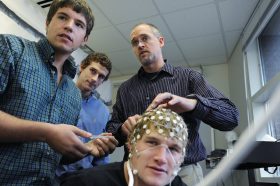The new institute now supports both students and student-athletes at Elon while continuing to lead evidence-based research and practice in the field of concussions and mental health.

Elon BrainCARE (Concussion Advocacy and Resilience Enhancement), a program that focuses on elevating the quality of the mentored undergraduate research experience through concussion research and education, is expanding to become a new research institute.
The program began about eight years ago in a partnership effort with Elon Athletics to help advance concussion-related testing. Under the directorship of faculty in the Department of Exercise Science, Associate Professor Caroline Ketcham and Professor Eric Hall, students have had the opportunity to work with student-athletes and members of the community to research and better understand the assessment, management and recovery time from sport-related concussions.
For the past three years, Hall says, Elon BrainCARE researchers have organized an annual symposium, published peer-reviewed articles, presented at national and international conferences and submitted multiple grants to external agencies. This work is a result of collaborations with students, staff and faculty at Elon, as well as with the University of Delaware, the University of North Carolina at Chapel Hill and Greensboro and Harvard University.
Elon BrainCARE is also collaborating with David Wyrick ’94 and Jeffrey Milroy, principal investigators of the Institute to Promote Athlete Health and Wellness at UNCG, who have secured one of eight NCAA-Department of Defense Mind Matters Research Challenge grants to design an evidence-based platform to increase concussion reporting. In addition, researchers are collaborating with UNC-Chapel Hill and the NFL to assess active recovery strategies in concussed student-athletes.
“BrainCARE is a national leader in educating student-athletes on the effects of and recovery from sport-related concussions. Their research is leading the effort of identifying factors that affect student-athlete reporting of concussive events and symptoms,” Wyrick says. “The potential public health impact of their work is tremendous as so many sport-related concussions go unreported and therefore untreated. We are excited to collaborate with the BrainCARE team to identify best practices for how college athletics can create and support health promoting environments that will not only improve the health and well-being of student-athletes related to concussions but also along the continuum of mental wellness.”

This growth in scope has led to the Elon BrainCARE expansion to support both students and student-athletes while continuing to lead evidence-based research and practice in the field of concussions and mental health, Ketcham says. She adds the purpose of the new Elon BrainCARE Research Institute is to help students and student-athletes thrive by helping create a supportive environment for them to become educated concerning the potential impact of concussions through evidence-based practices and research; and by creating health promoting environments that support resilience and positive mental wellness.
“The Elon BrainCARE Institute is a tremendous accomplishment for the university and will serve to be a great asset to the Elon Sports Medicine Department,” says Dr. Kirtida Patel, Elon’s sports medicine team physician. “It will provide innovative research to address the evolving clinical questions surrounding concussions.”
Hall says they look forward to continuing to partner with athletics, sports medicine and student health/wellness while expanding their collaborations across campus “to investigate, promote and educate a community that nurtures and develops resilient students /student-athletes.”
What others say about Elon BrainCARE
“Elon BrainCARE has become an invaluable service for Elon University Athletics and the student-athletes. Dr. Caroline Ketcham and Dr. Eric Hall have created a state of the art facility that not only offers research opportunities for students at Elon but rivals any in Division I collegiate athletics. The mental health education, baseline testing, and concussion follow-up that Elon BrainCARE along with our team physician’s ensures that student-athletes at Elon University receive the most up-to-date information on mental wellness and concussion management.” —Eric Storsved, head athletic trainer, Elon University
“We are excited to work with Elon BrainCARE in the pursuit of better treatment and outcomes following concussion. It is exciting to work with such established and compassionate colleagues who share our common interest in improving the well-being and care of students and athletes across the life-span, through strong science and collaboration.” —Johna K. Register-Mihalik, exercise and sport science, Injury Prevention Research Center, and Matthew Gfellar, Sport-Related TBI Research Center, UNC-Chapel Hill
Student Xernay Aniwar ’17 contributed to this story


